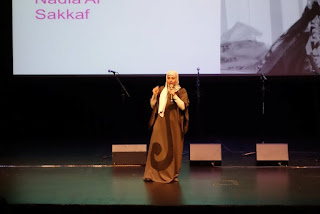The event was, as usual, opened with a word from organizer Tamer Nahas, who introduced the BOLDTalks concept. As with the main conference earlier this year, it was held at it's new home this year, Madinat Theatre.
The event got off to a great start with the first speaker, Rana Husseini, who talked about how she came to fight against violence inflicted upon women in order to preserve an archaic notion of social honor. Resolving, as a young journalist, to not let these "honor killings" go unreported or under-reported, she brought the issue into the spotlight in her native Jordan. An imposing and determined woman, she persevered in raising broad awareness of the problem until the government stopped letting the murderers get away with light penalties, as was previously the case. She also provided many somber statistics on the prevalence of honor killings, the motivations, and the perpetrator profiles (which included the role of women in perpetrating or covering up the murders).
Cath Turner, an NYC-based Al Jazeera English reporter, was next, talking about her experience tracing her origins to the evacuation of Saigon at the end of the Vietnam War. She spoke about how "Operation Babylift", the airlifting of Vietnamese babies like herself out of South Vietnam, followed by their resettlement in adoptive homes (in her case, that of a white Australian family), was more about propaganda value. She played clips from a documentary of hers to illustrate this discovery, and the story of how she tracked and was reunited with her biological mother. While I sympathized with her having been drafted as a baby into an American propaganda campaign, and the discomfort she experienced growing up as a "visible minority", I quite disagree with how she extended that experience to apply to all adoptions across racial lines. I certainly don't agree with her perception of the importance of "blood and soil", and of socialization of children with others who look like them.
The final speaker before lunch was sassy Yemeni self-appointed "queen" Nadia Al-Sakkaf. Herself the daughter of a - fortunately - supportive father, she was able to take advantage of relatively (for women) rare educational opportunities, and rise professionally to become the chief editor of the Yemen Times. She shared some inspiring stories of how various Yemeni girls and women had overcome barriers to women put in place by the patriarchal society into which they were born. She also spoke about how the situation for women in Yemen is getting better, contrary to general perception. Hers was one of the best talks of the day, as she was an excellent orator, and had some great stories and insights to share.
After a hearty lunch, we were audience to a violin performance by Nadine Artuhanava while attendees returned to their seats.
There were two speakers post-lunch, the first of whom was Accenture's Rebecca Schmitt. Hers was also one of the best talks of the day, as she narrated her journey through her career while taking on incremental challenges of motherhood. Eventually going through a period of settling for a contained part-time job as her brood expanded, she talked about the decision to do so. She went on to talk about how she eventually landed up in India, becoming the breadwinner of her family, while her husband became a stay-at-home dad, and how this situation was perceived socially. Accenture being the lead sponsors, I was concerned that her talk would have a lot of corporate spiel. This was not the case, thankfully.
The second and final speaker was Rania Amer, the founder of the Pure Heart Program. She discussed the challenges of reintegrating cancer survivors into the workforce, and talked about her efforts in combating prejudice against them returning to productive jobs suitable for them. One of these efforts is a novel job fair aimed specifically at cancer survivors, and linking them up with prospective employers.
For her work with cancer survivors, Amer was presented with an award by a representative of the lead sponsor, Accenture.
The show closed on a musical note, as the all-female Indian pop fusion quartet Indiva took to the stage to entertain us with song and story, including their recent awareness-raising song about anti-woman violence, Suno. A couple of jam numbers with Julie-Ann of Dubai Drums was included.
All the featured speakers were accomplished, and had taken a stand for what they believed was right. Husseini, Al-Sakkaf and Schmitt, especially, were not only accomplished women, but also addressed issues specifically related to women's lives and challenges, and so fit the event's stated purpose more closely. All in all, I think the event was worth attending for the perspectives and narratives of these female achievers.














No comments:
Post a Comment